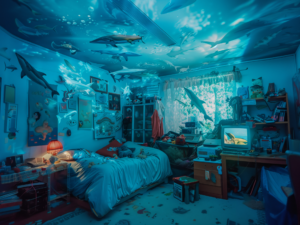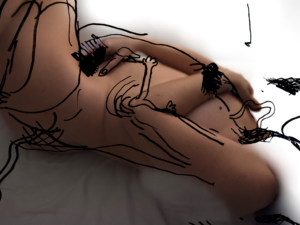From: A Somewhat Unusual Interview
Cardinale: I will tell you about a dream that I have dreamed repeatedly.
Moravia: When did you dream it?
CC: About five years ago.
AM: What did the dream look like?
I dream of falling out of a window, with the feeling of falling into a vast emptiness.
And then?
And shattering …
Shattering?
Yes, how my body fell on the pavement and shattered on impact.
An unpleasant sensation?
A strange sensation.
Shatter how, exactly?
Shattering into pieces.
Like a glass vase or another fragile object?
No, like a human body, like my body.
And then what?
I remember the exact moment I hit the ground as I fell.
What did you hit it with?
My head.
And then?
Then I hear the loud, dull sound of my body, which the impact shatters and tears into pieces, and I wake up.
Did you wake up calmly or horrified and shocked?
Horrified and shocked, but not too much.
Do you remember other dreams?
I often have nightmares.
What kind?
I see things in the distance, far away, but still clear and sharp.
What kind of things?
Like the blanket, for example, which instead of being near, is very, very far.
And what else?
The telephone, far, far back.
Back where?
In the dark, in the infinite.
Do these things stay far away, or do they move and come closer?
Sometimes they are too close and stick to me, then I have the blanket in my eyes, the telephone on my pupils.
What do you feel during these nightmares?
A feeling of emptiness, of disgust.
And you wake up?
Not always. By the way, these nightmarish things happen to me even when I’m awake.
When?
Especially in the evening, before falling asleep.
What happens then?
I can no longer judge the measure of things around me.
What does that mean?
For example, it seems to me that the nightstand is very far away. But it’s right next to the bed.
So it’s not the measure of things, it’s the distance?
No, it’s the measurement.
How do you explain these things?
I can’t explain them because I don’t understand them.
You never dream of other people?
Yes, occasionally I dream about other actors.
Don’t you dream about the man you love or, at least in your dreams, think you love?
I never dream of personal things, only absurd things.
Such as?
Once I dreamed that I was standing on a balcony on the fifth floor, and suddenly a gust of wind swept a small three-year-old child off the balcony; after that, I ran downstairs, completely distraught, to look for the child’s body, I came out into the street and asked all the passers-by where the child has fallen, finally, I find a scrap of his clothes under the iron arch, I continued to look for his body, crying, until they told me that the child has been taken somewhere, I think to hospital, in any case, it is not dead, although it fell from the fifth floor, and then I go to the hospital to visit the child, and at that moment I wake up.
More bodies falling? Your own, the child’s …
Mmm …
Are these bodies clothed or naked?
The child’s is clothed.
And yours?
Mine naked.
Now tell me: What do these dreams have to do with what you are when you’re awake?
I do not know.
I will tell you: Nothing. Because if these dreams were related to what you are and want to be in a waking state, you would not dream them. The circumstance that you have nothing to do with them, that you do not feel affected, not responsible for them, although you dream them, this very circumstance allows you to dream them. But let us continue. You went to bed at one o’clock and fell asleep. Whether you were dreaming or not, what were you doing at two?
I’m asleep.
At three?
Asleep.
At four?
Asleep.
At five?
Sleep.
At six?
Sleep.
At seven?
Sleep.
At eight?
Sleep.
At nine?
I wake up at nine.



